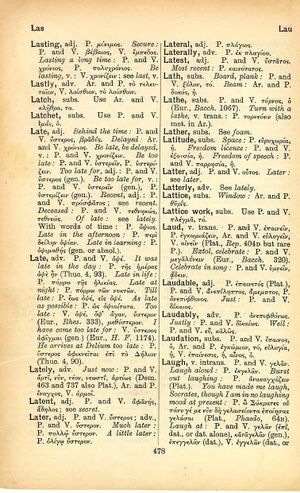late: Difference between revisions
(CSV4) |
(6_9) |
||
| Line 23: | Line 23: | ||
<b class="b2">I have come too late for</b>: V. [[ὕστερος]] ἀφῖγμαι (gen.) (Eur., ''H.F.'' 1174). | <b class="b2">I have come too late for</b>: V. [[ὕστερος]] ἀφῖγμαι (gen.) (Eur., ''H.F.'' 1174). | ||
<b class="b2">He arrives at Delium too late</b>: P. [[ὕστερος]] ἀφικνεῖται ἐπὶ τὸ Δήλιον (Thuc. 4, 90). | <b class="b2">He arrives at Delium too late</b>: P. [[ὕστερος]] ἀφικνεῖται ἐπὶ τὸ Δήλιον (Thuc. 4, 90). | ||
}} | |||
{{Lewis | |||
|lshtext=<b>lātē</b>: adv., v. 1. [[latus]]. | |||
}} | }} | ||
Revision as of 08:35, 13 August 2017
English > Greek (Woodhouse)
adj.
Behind the time: P. and V. ὕστερος, βραδύς. Delayed: Ar. and V. χρόνιος. Be late, be delayed, v.; P. and V. χρονίζειν. Be too late: P. and V. ὑστερεῖν, P. ὑστερίζειν. Too late for, adj.: P. and V. ὕστερος (gen.). Be too late for, v.: P. and V. ὑστερεῖν (gen.), P. ὑστερίζειν (gen.). Recent, adj.: P. and V. πρόσφατος; see recent. Deceased: P. and V. τεθνηκώς, τεθνεώς. Of late: see lately. With words of time: P. ὄψιος. Late in the afternoon: P. περὶ δείλην ὀψίαν. Late in learning: P. ὀψιμαθής (gen. or absol.). adv. P. and V. ὀψέ. It was late in the day: P. τῆς ἡμέρας ὀψὲ ἦν (Thuc. 4, 93). Late in life: P. πόρρω τῆς ἡλικίας. Late at night: P. πόρρω τῶν νυκτῶν. Till late: P. ἕως ὀψέ, εἰς ὀψέ. As late us possible: P. ὠς ὀψιαίτατα. Too late: V. ὀψέ, ὄψʼ ἄγαν, ὕστερον (Eur., Rhes. 333), μεθύστερον. I have come too late for: V. ὕστερος ἀφῖγμαι (gen.) (Eur., H.F. 1174). He arrives at Delium too late: P. ὕστερος ἀφικνεῖται ἐπὶ τὸ Δήλιον (Thuc. 4, 90).
Latin > English (Lewis & Short)
lātē: adv., v. 1. latus.

